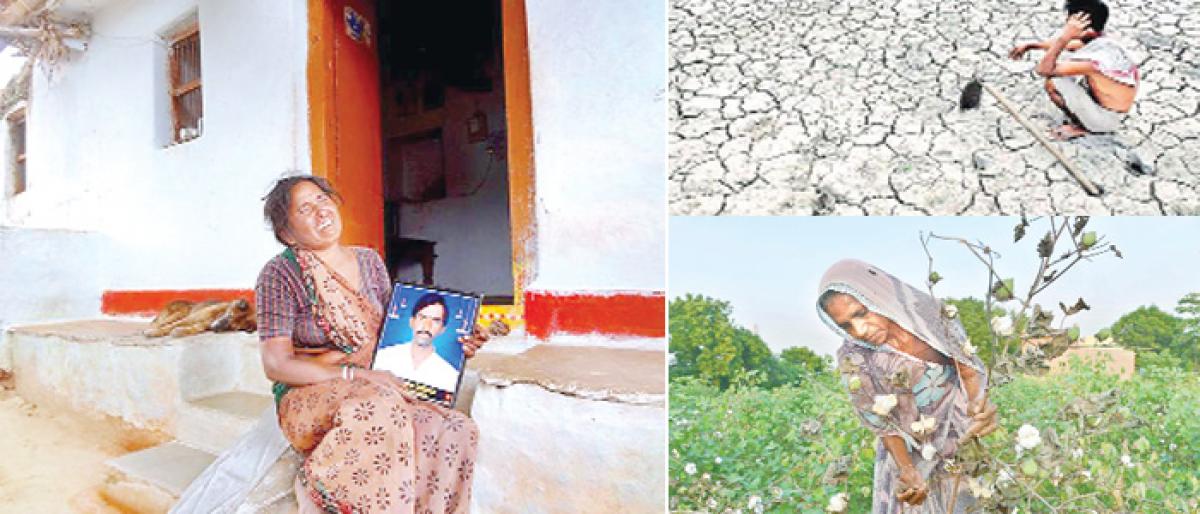Live
- A Guide to Temperature and Humidity Standards in Data Center Server Rooms
- Gadwal collector briefs on details of voters
- Jupally Krishna Rao takes part in Alampur rallu
- Bharath Prasad files 3rd Nomination
- Baisakh Month: A Time of Auspicious Beginnings and Sacred Festivals
- Oust BJD govt for overall development, says Shah
- Unveiling the Hidden Gems: Surprising Health Benefits of Garlic Peels
- Overcoming Sleep Struggles: A Comprehensive Guide to a Restful Night
- RTC bus hit the auto
- MLA Kuchukula Rajesh Reddy participated in the Birappa festival
Just In

The latest study on farmer suicides between 2014-18 conducted by Rythu Swarajya Vedika (RSV) and Tata Institute of Social Sciences (TISS) during May-June 2018 reveals several interesting facts about the plight of tenant farmers in Telangana and how being excluded from the agrarian outreach scheme, Rythu Bandhu, is adversely affecting the farmers. The team collected details of 692 farmer suicide ca
Hyderabad: The latest study on farmer suicides between 2014-18 conducted by Rythu Swarajya Vedika (RSV) and Tata Institute of Social Sciences (TISS) during May-June 2018 reveals several interesting facts about the plight of tenant farmers in Telangana and how being excluded from the agrarian outreach scheme, Rythu Bandhu, is adversely affecting the farmers. The team collected details of 692 farmer suicide cases for the study.
Out of 692 farmers who committed suicide during 2014-18, 520 were tenant farmers who had taken land on lease and cultivated in it. This means 75.14 per cent of farmer suicides were by tenant or lessee farmers. Out of this, 18 per cent were totally landless. Another 46 per cent were marginal land-holders.
64 per cent of the tenant farmers were holding less than 2.5 acres of land. Another 30 per cent were small farmers, holding between 2.5 and 5 acres of land. The study found that about 94 per cent of the tenant farmers committing suicide are small and marginal farmers or landless.
Kiran Vissa, agriculture activist of RSV says, “93 per cent of farmer suicides are by marginal and small and landless farmers. Excluding them from Rythu Bandhu scheme is doing injustice to the real tillers of the soil who, according to the government’s own records, comprise 20.1 percent of land-holdings.”
The study says the proportion in farmer suicides is remarkably higher at 75 per cent. The government asserts that the lessee cultivators is less in Telangana and lease agreements are short-term and vary from year to year, so it is difficult to identify tenant cultivators. The study with a sample size of 692 families in all districts of the State with cases studied in 23 districts of Telangana reveals the leasing pattern as relatively stable.
Kiran Vissa says, “The study shows 50.4 per cent of the tenants have been leasing the land from the same owner for three to five years. Another 28.2 per cent have been leasing the same land for more than five years, which indicates a long-term relationship. Only 21 per cent have had it for 1-2 years.”
The maximum suicides are from Nalgonda 93 per cent, Yadadri-Bhuvanagiri 87 per cent, Adilabad 86 per cent and Mancherial 95 per cent. 265 out of the 520 tenant farmers who committed suicide reported no outstanding bank loans but an average of more than Rs 4 lakh private loans, so it was the pressure of private loans that led to suicides.
Among the landless, the average bank loan was only Rs 11,000 while the average outstanding private loan was Rs 3.64 lakh. The average bank loan was Rs 38,000 while the average private loan was Rs 3.85 lakh. 81.4 percent of farm suicide families cultivated cotton.
The claim that the support given to land owners will get transferred to the tenants by way of reduction in the lease amounts paid by the tenants does not hold good, avers B Kondal who was part of the survey. “There was hope that the land owners would reduce the lease amount but nothing of that sort happened. 50 per cent of land owners are either employees or businessmen.”
Citing an example, he shares, “ Baddineni Lakshmanna, a tenant farmer, who committed suicide on May 18, 2018 from Lakshmikantapur village in Dandepally mandal of Mancherial district, had a private loan of Rs 4 lakh and bank loan of Rs 30,000. Due to pressure of the private moneylenders, he committed suicide.”

© 2024 Hyderabad Media House Limited/The Hans India. All rights reserved. Powered by hocalwire.com







